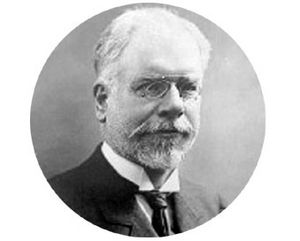Léon Duguit facts for kids
Léon Duguit (born in 1859, died in 1928) was a very important French expert in public law. Public law is about how the government works and how it relates to its citizens. He first worked in Caen from 1882 to 1886. Later, in 1892, he became a professor of constitutional law at the University of Bordeaux. Constitutional law is about the basic rules and laws that a country follows. One of his colleagues there was a famous thinker named Émile Durkheim.
Duguit had new and interesting ideas about public law. He believed that the state (which means the government and its systems) was not a magical ruler above everyone else. Instead, he saw the state as simply a group of people who work to provide public services for everyone. These services, like running schools or hospitals, are what make the state real and give it its purpose.
He questioned ideas like sovereignty (the idea that a state has supreme power) and even property rights. He thought that property should only be allowed if it served a useful purpose for society. Even though he questioned these big ideas, he was different from Marxist thinkers. He still believed that the economy played a very important role in how the state developed.
Contents
What Did Léon Duguit Believe?
The State as a Service Provider
Léon Duguit had a fresh way of looking at how governments work. He didn't see the state as a powerful, all-knowing ruler. Instead, he thought of it as a group of people. These people are simply working together to provide important services for everyone.
For Duguit, the main reason a state exists is to serve its citizens. Things like building roads, running schools, or providing healthcare are examples of these services. He believed that these actions are what make a government legitimate and give it its power.
Challenging Old Ideas
Duguit was known for questioning traditional ideas. He didn't agree with the idea of "sovereignty." This is the belief that a state has ultimate, unquestionable power over its people. He thought this idea was too old-fashioned.
He also looked closely at the idea of "legal personhood." This is the idea that a group or organization can act like a single person in the eyes of the law. Duguit believed that these concepts were not as important as the actual services the state provided.
Property and Society
Even the idea of "property" was something Duguit thought about deeply. He believed that owning property should have a social purpose. If property didn't benefit society in some way, he questioned why it should be allowed.
However, it's important to know that he was not a Marxist. Marxists have very different ideas about property and the economy. Duguit still thought the economy was very important for how a state grows and changes.
His Important Books
Léon Duguit wrote many influential books about his ideas. These books helped shape how people thought about public law for many years.
- L'État, le droit objectif et la loi positive (The State, Objective Law, and Positive Law). Parts of this book were translated into English as "Theory of Objective Law Anterior to the State."
- L'État les gouvernants et les agents (The State, the Rulers, and the Agents).
- Souveraineté et liberté (Sovereignty and Liberty).
- Les transformations du droit public (The Transformations of Public Law).
- Traité de droit constitutionnel (Treatise on Constitutional Law). This book was later translated into English by Margaret Grandgent and Ralph W. Gifford.
See also
 In Spanish: Léon Duguit para niños
In Spanish: Léon Duguit para niños
 | Dorothy Vaughan |
 | Charles Henry Turner |
 | Hildrus Poindexter |
 | Henry Cecil McBay |


